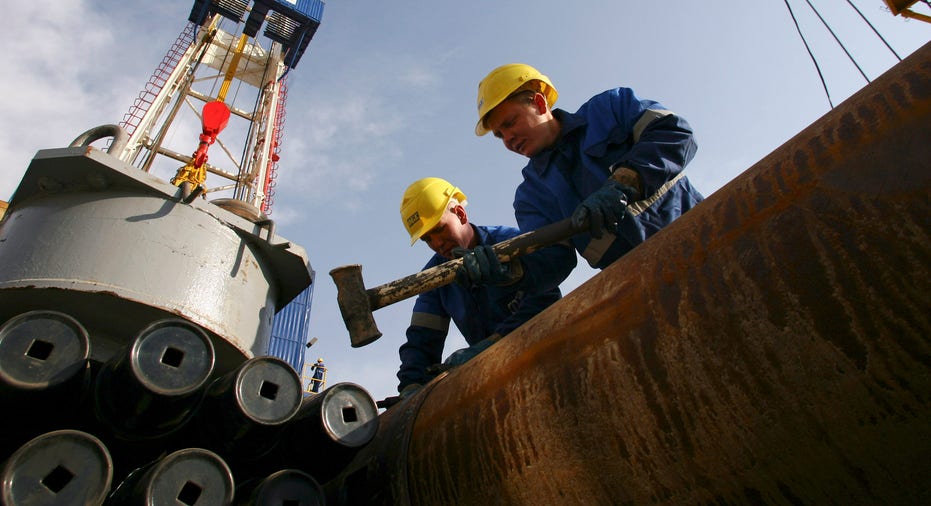U.S. Weighing Release of Strategic Oil Reserves

The United States is considering a release from its strategic oil reserves, Treasury Secretary Timothy Geithner said on Friday, acknowledging the harm that supply disruptions from Iran could have on the global economy.
Rising tensions between Iran and the West over its disputed nuclear program have fueled a rise in oil prices, pushing benchmark Brent crude above $125 a barrel on Friday.
"There is a case for the use of the reserve in some circumstances and we will continue to look at those and evaluate that carefully," Geithner said on CNBC television.
"Obviously Iran can do a lot of damage to the global economy," Geithner said. "We are working very carefully to try to minimize that risk, make sure there are alternative sources of supply from Saudi Arabia and others to help compensate for reduced exports from Iran."
The United Nations' nuclear watchdog, the International Atomic Energy Agency, warned on Friday that Iran has sharply stepped up its uranium enrichment drive. The IAEA report was seen as inflaming fears in Israel, which has threatened pre-emptive strikes on Iran's nuclear sites to stop it pursuing an atomic weapons program.
The fear of tightening supplies, exacerbated by a threat from Tehran to close the Strait of Hormuz - the main Gulf oil shipping lane - have driven oil prices higher, putting political pressure on President Barack Obama, who is running for re-election in November.
The appetite for a coordinated opening of reserves by the United States and other nations may not be as high as last June, when Western nations agreed to release a total of 60 million barrels of oil in response to supply disruptions from Libya.
Angel Gurria, secretary general of the Organisation for Economic Co-operation and Development, said releasing reserves now would not help dampened oil prices.
"These prices are due to a great extent ... because there is a lot of tension, these discussions every day over the Straits of Hormuz and Israel," he said on the sidelines of a Group of 20 meeting in Mexico City.
"That would not be solved by releasing reserves."
The International Monetary Fund flagged higher oil prices as a rising threat to the global economy on Friday, urging policymakers to keep a close eye on western tensions with Iran.
Looming U.S. sanctions on Iran's oil buyers, as well as an impending European Union oil embargo, have forced countries to cut back on purchases from the world's fifth-largest exporter of crude, pushing up the price of the commodity.
"A new risk on the horizon, or maybe not on the horizon, maybe right in front of us, is high oil prices," David Lipton, first deputy managing director of the International Monetary Fund, said in a presentation at the G20 gathering.
"The situation in Iran is a risk that we have to be thinking about. Our assessment is that the global economy is not really out of the danger zone," Lipton added.
ELECTION YEAR BACKDROP
Obama, who is running for re-election on Nov. 6, is under pressure, including from within his own party, to take steps to keep gasoline prices down to preserve the U.S. economic recovery.
U.S. consumers have seen the price of fuel jump nearly 9 cents in the past week to an average of $3.61 a gallon. The cost is expected to rise further toward $4 or higher through the summer driving season.
Geithner said part of the reason oil prices were rising was a strengthening economy, and he urged Americans to take a long view.
"There is no quick fix to this. No short-term fix to this," he said, adding the best strategy for the United States was to continue to make long-term investments to expand U.S. production, reduce the country's dependence on foreign oil and encourage Americans to use energy more efficiently.
The White House declined to comment about specific talks regarding a Strategic Petroleum Reserve release.
Oil prices fell 8 percent in the days following the announcement of last year's coordinated release.
A handful of Democratic lawmakers on Wednesday said the White House should consider tapping stockpiles again to send a message to Iran that the United States is willing to use its emergency reserves.
David Goldwyn, who headed international energy affairs at the State Department until early 2011, said an SPR release now could be a hard sell.
"Absent a new significant disruption, it is hard to see the justification for an SPR release, much less a coordinated release with the IEA," Goldwyn said. "Rising gasoline prices alone are not a significant justification."
Goldwyn said one key bellweather to watch in the coming weeks will be the Obama administration's decision on whether to grant waivers to U.S. sanctions for up to 120 days for countries that buy Iranian oil.
The decision on the waivers will require the White House to weigh in officially on whether there is enough supply for countries to stop using Iranian crude. (Additional reporting by Dave Graham, Timothy Gardner, Ayesha Rascoe and Samson Reiny; Writing by Jeff Mason; Editing by Eric Walsh)



















